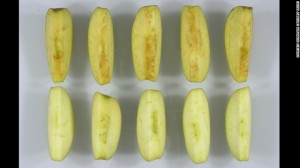Okanagan Specialty Fruits located in British Columbia just created the first Genetically Engineered (GE) apple to become legal for mainstream sale and consumption: The Arctic® apple. It has been engineered to not turn brown or bruise. This milestone for the biotechnology sector of the food system in America raises many ethical and health concerns.

Image Credit Arctic® apple
Lets look at the name first and pause. Arctic® apples. The trademark symbol identifies that this good is different than other similar goods (i.e. other apples). Trademarks appear on human inventions. They denote ownership and intellectual property. Food is naturally occurring and should be a right to all humans. The trademark represents inherent ethical problems with the engineering of food.
There are many arguments for ethical pros to engineered food, most of which center around producing larger amounts of cheaper food in a “reduced risk” environment in order to feed the growing human population. I have plenty to say to dispute these claims, but I will save that for another post. Mainly because this apple invention does not fulfill even an idealistic account of manipulating food to feed the world. The human tampering that turned off the enzyme that causes apples to turn brown is purely cosmetic.
However, I would argue that the implications are far beyond cosmetic. The natural browning of apples once cut or after a long period of time is a natural cue that the fruit has begun to spoil. While it is still often safe to eat an apple at a certain level of brownness, eventually it is a sign that the apple is too old or has been exposed and susceptible to bacteria for too long. The lack of browning could lead to higher chance of consumers eating contaminated apples. The Okanagan website does not address this safety point. It does argue though that the invention is beyond cosmetic: it will save profits for every part of the supply chain due to its longer shelf life. Putting profits before human and environmental safety is a choice that drives our food system far too often and has already caused epidemic levels of obesity, diabetes, cancer, heart disease, and has still not cured world hunger.
The GE apple will be another wedge put between humans and our food system, reducing the understanding of our natural relationship.
The creation and testing of GMO and GE foods can be a foreign language to the general public. The USDA deregulation announcement of arctic apples and the Q&A does not instill much more understanding or trust in the process. Although there was space for the public to comment on the process, the USDA acknowledges that comments about general concern of GE plants were not taken into account, and “final decision can only be based on its analysis”. In addition, the FDA did no independent testing of the product.
The lack of democracy and transparency of our food system is frightening when there is such a large amount of public outcry against such advancements. Farmers fear cross-pollination. Exporters are threatened by the possible cross contamination affecting export sales which are currently one third of the apple industry. Consumers are against being used as lab rats for unnecessary products. And everyone who is a non-GMO advocate is simply pissed and scared that the right to choose natural food may be highjacked from the lack of responsibility being exhibited by the biotech and big agricultural industry.
The lack of regulation with labeling means this product could end up in juice, baby food, apple sauce, and other processed fruit products without consumer knowledge. Major companies such as McDonalds and Gerber have already publicly declared to not use Arctic® apple.
The product is on track to hit shelves as soon as 2016. There is still time to put pressure on companies to not buy the product. Please exercise your voice on the petitions below and leave comments about your ideas on GE food.
Reject “Arctic” Apple • Put a Freeze on Arctic Apples
No GMO Apples • Just label it!
the irresistible fleet of bicycles
